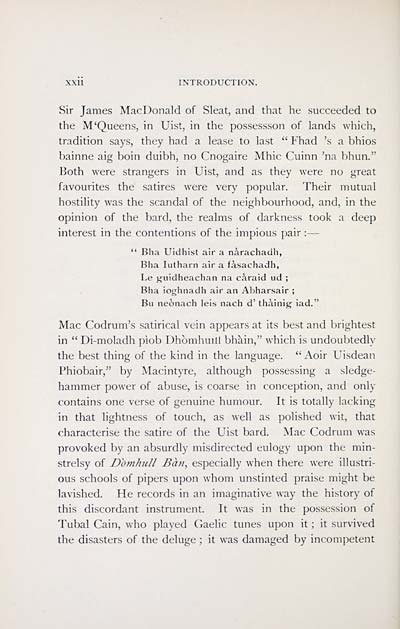Hew Morrison Collection > Poems and songs of John MacCodrum, Archibald MacDonald, and some of the minor Uist bards
(40)
Download files
Complete book:
Individual page:
Thumbnail gallery: Grid view | List view

XXll INTRODUCTION.
Sir James MacDonald of Sleat, and that he succeeded to
the M 'Queens, in Uist, in the possessson of lands which,
tradition says, they had a lease to last " Fhad 's a bhios
bainne aig boin duibh, no Cnogaire Mhic Cuinn 'na bhun."
Both were strangers in Uist, and as they were no great
favourites the satires were very popular. Their mutual
hostility was the scandal of the neighbourhood, and, in the
opinion of the bard, the realms of darkness took a deep
interest in the contentions of the impious pair : —
" Bha Uidhist air a nàrachadh,
Bha lutharn air a fàsachadh,
Le j^iiidheachan na cAraid ud ;
Bha ioghnadh air an Abharsair ;
Bu neònach leis nach d' thàinig iad."
Mac Codrum's satirical vein appears at its best and lirightest
in " Di-moladh piob DhomhuiU bhàin," which is undoubtedly
the best thing of the kind in the language. " Aoir Uisdean
Phiobair," by Macintyre, although possessing a sledge-
hammer power of abuse, is coarse in conception, and only
contains one verse of genuine humour. It is totally lacking
in that lightness of touch, as well as polished wit, that
characterise the satire of the Uist bard. Mac Codrum was
provoked by an absurdly misdirected eulogy upon the min-
strelsy of Domhull Ban, especially when there were illustri-
ous schools of pipers upon whom unstinted praise might be
lavished. He records in an imaginative way the history of
this discordant instrument. It was in the possession of
Tubal Cain, who played Gaelic tunes upon it ; it survived
the disasters of the deluge ; it was damaged by incompetent
Sir James MacDonald of Sleat, and that he succeeded to
the M 'Queens, in Uist, in the possessson of lands which,
tradition says, they had a lease to last " Fhad 's a bhios
bainne aig boin duibh, no Cnogaire Mhic Cuinn 'na bhun."
Both were strangers in Uist, and as they were no great
favourites the satires were very popular. Their mutual
hostility was the scandal of the neighbourhood, and, in the
opinion of the bard, the realms of darkness took a deep
interest in the contentions of the impious pair : —
" Bha Uidhist air a nàrachadh,
Bha lutharn air a fàsachadh,
Le j^iiidheachan na cAraid ud ;
Bha ioghnadh air an Abharsair ;
Bu neònach leis nach d' thàinig iad."
Mac Codrum's satirical vein appears at its best and lirightest
in " Di-moladh piob DhomhuiU bhàin," which is undoubtedly
the best thing of the kind in the language. " Aoir Uisdean
Phiobair," by Macintyre, although possessing a sledge-
hammer power of abuse, is coarse in conception, and only
contains one verse of genuine humour. It is totally lacking
in that lightness of touch, as well as polished wit, that
characterise the satire of the Uist bard. Mac Codrum was
provoked by an absurdly misdirected eulogy upon the min-
strelsy of Domhull Ban, especially when there were illustri-
ous schools of pipers upon whom unstinted praise might be
lavished. He records in an imaginative way the history of
this discordant instrument. It was in the possession of
Tubal Cain, who played Gaelic tunes upon it ; it survived
the disasters of the deluge ; it was damaged by incompetent
Set display mode to: Large image | Transcription
Images and transcriptions on this page, including medium image downloads, may be used under the Creative Commons Attribution 4.0 International Licence unless otherwise stated. ![]()
| Early Gaelic Book Collections > Hew Morrison Collection > Poems and songs of John MacCodrum, Archibald MacDonald, and some of the minor Uist bards > (40) |
|---|
| Permanent URL | https://digital.nls.uk/81340243 |
|---|
| Description | A selection of items from a collection of 320 volumes and 30 pamphlets of literary and religious works in Scottish Gaelic. From the personal library of Hew Morrison, the first City Librarian of Edinburgh. |
|---|
| Description | Selected items from five 'Special and Named Printed Collections'. Includes books in Gaelic and other Celtic languages, works about the Gaels, their languages, literature, culture and history. |
|---|

